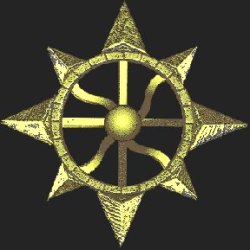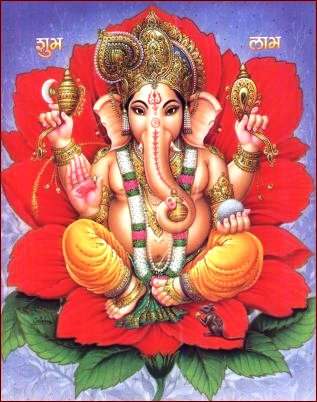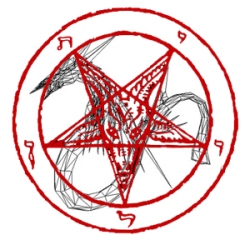I strongly believe we need to talk to each other about our spiritual lives. Even though we may respectfully disagree, I believe that peaceful co-existence of all religions in the 21st century depends on this.
|
Some people believe the solution to religious conflict is to suppress or exterminate spirituality, at the very least by ridicule. I think history shows this is highly unrealistic— look at the way religious life has sometimes thrived under active persecution. Polls consistently show that even with a decline in traditional beliefs, new spiritual practices are springing up to take their place. Whatever the spiritual landscape looks like in a few hundred years time, I doubt it will be 100% atheist.
Hence, I interview various believers and non-believers here on Spritzophrenia. I’m grateful to Freeman Presson for his willingness to share about his life. Freeman strikes me as a humorous and thoughtful man. Without further ado, I present: |

Symbol of Utu? Sumerian sun God, known as Shamash in Akkadian
|
Interview with a Pagan
Jonathan: Freeman, let’s start with the classic “Age, Sex, Location?”
Freeman: Birmingham, Alabama, USA will do nicely. I don’t need to hide, I don’t even remember where the closet is. I’m going to pass on that age question, don’t want to give anyone the wrong impression. Let’s just say I have been an adult for a fairly long time now.
Jonathan: Tell me a bit about your background – did you have any kind of spiritual upbringing?
Freeman: I was raised in a mainstream Protestant church. My first mystical experience happened in that church when I was four — but it was before a service, and had nothing to do with Christianity. I was a
fairly devout little guy from ages 8 – 12, until I decided to actually read the entire Bible.
I put it down after finishing Revelation, and I remembering thinking “I don’t know what I am, but it’s not that.”
I got along with closet atheism for a while, but the spiritual realm was not done with me. Along with a lot of this and that, including some early attempts at magic, and some intense experiences with entheogens in my late teens/early twenties, I settled into a phase of “dabbling in Zen.” Then there’s another blank spot before I found a teacher and spent over 10 years really practicing.
I sort of abruptly exited regular Zen practice in the late 90’s, and along with my new love (now my wife), began to explore some more down-to-earth experiences.
Jonathan: How would you describe your spiritual path now? How did you come to practice what you do?
Freeman: It started with figuring out what sort of experiences my wife was having, and developed from there. Her tutelary spirit, Lilith/Lilitu, introduced us to some other deities from the Ancient Near East. I had never heard of my Ilu, Ningishzida, before I was directed to work with him. It had the definite feel of bringing someone out of a quiet semi-retirement.
When we found some other people who wanted to participate, we formed Temple Zagduku. Our work is a mixture of shamanic, devotional, and magical practices. We have more or less regular relationships with six
Deities. We adopted the motto “Namsaga,” which is one of the Sumerian terms for pleasure: as far as we could tell, it is the closest to “bliss,” as in “Follow your bliss.” It’s our equivalent of “Do what thou Wilt shall be the whole of the Law.”
So we are loosely reconstructive, hard polytheists, although I am at root “model agnostic” about the workings of the Divine. If someone wants to insist that it’s “all in the mind,” I just grin and say, “So
you agree with me that the mind is a vast and wonderful place. Good.”
Jonathan: Can you tell me a bit more about what a “hard polytheist” is?
Freeman: That is one way to classify a point in the space of modern Pagan theologies. Some people believe the Gods are some sort of archetype or function of the mind; some believe they are all aspects of the One; but a hard polytheist accepts the simple explanation that there are individual Gods and Daimones who each have their own powers and personalities.
As I said before, when people say that the Gods are archetypes or whatever, I don’t argue with them. I might say, “So, the Gods are all in your mind? At least we agree that the mind is a large and strange place.”
[Jonathan’s note: We discussed polytheism on Spritzophrenia at White Men Need More Ganesh]
Jonathan: What does your magic involve?
Freeman: Nowadays I do more meditation and journey work: theurgy rather than thaumaturgy. It’s about developing my self and my relationships with my Deities and guides rather than producing “special effects” in the outer world.
Jonathan: What’s your day to day life like? Do you spend your whole time doing ‘spiritual’ stuff?
Freeman: Quite the opposite, it is a struggle to find time to do my practices any more, or to schedule anything with a group. We are busy folks with a little kid like anyone else.
Jonathan: Why the Sumerian connection, for you? You sound like you’ve researched that a bit.
Freeman: I don’t know why I, in particular, would have that connection. You’d expect Celtic or perhaps Germanic Deities, or something from the American Indian realm; but they called me. It would never have occurred to me. I tried to work with Hermes first. I got a sense of “something” there but no real interaction. Then I got “clobbered” by my Goddesses and introduced to some of the others.
Jonathan: (The question I ask everyone) How do you know your beliefs are true?
Freeman: I don’t call something a “belief” if I know it’s true. The phrase” scientists believe” in place of “current scientific theory suggests” gripes my butt. I have had experiences that I couldn’t have had any other way, and my experiences are undeniable. If I could ‘prove” any of it, it would be science instead of spirituality.
I do not have to justify my spiritual practices and experiences. I’m not selling them as a cure for anything but boredom… but spiritual boredom (anomie) is a serious condition in its own right.
Jonathan: Thankyou Freeman, I hope to chat again in future.
Freeman: You’re welcome.
.
.
For those interested in reading further, Freeman writes at http://freemanpresson.wordpress.com and http://ulbh.livejournal.com You can also read about one of my own Pagan experiences and more interviews. If you’d like me to interview you, leave a comment.
What questions would you ask Freeman? (He may pop in and answer if we’re lucky.) What other thoughts has this raised for you?
Please share this article:













